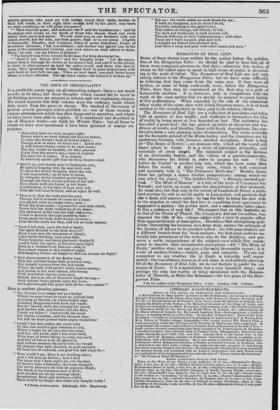ROMANCES OF REAL LIFE*.
SOME of these stories were written by the author before the publication of the Hungarian Tales : we should be glad to hear that all of them were composed previous to that date ; otherwise this writer, of whom we felt called upon to speak in high terms of praise, is descending in the scale of talent. The Romances f Real Life are not only utterly inferior to the Hungarian Tales, but we have some difficulty in believing that they come from the same pen. If they were all written, as some of them confessedly were, before the Hungarian Tales, then they may be considered as the first step in a path of honourable exertion. It is, however, only in comparison with the work of the same author that we should be induced to speak lightly of this performance. When regarded by the side of the numerous other works of the same class with which the press teems, it is at least entitled to the consideration we have paid to far inferior efforts.
The Romances of Real Life are a collection of anecdotes and tales, told at greater or less length ; and vindicate to themselves the title of reality by being more or less founded on fact. The authoress has travelled a good deal : she has picked up traits of character and traditions of events, and blending them with lively descriptions, has contrived to form a yery pleasing series of narratives. The scene is chiefly on the favourite ground of the Rhine-banks, and the characters are by preference German, with, however, marked exceptions. Such is that of "The Reign of Terror,"—an ominous title, which all the world will know where to locate. It is a story of particular absurdity, and unluckily of great length. The hacknied subject is the distress of an aristocratic family, and the villany of a pseudo-democrate, who denounces his friend in order to possess his wife. "The Lettre de Cachet" is another long tale, which has been some time before the world. A third long story, which is well contrived and agreeably told, is "The Princess's Birth-day." Besides these, there are perhaps a dozen shorter compositions ; among which we may select for praise, "The Soldier-Priest," aStrongly-marked portrait. "The Maid of Honour" is a tale of the reign of 'CHARLES the Second; and turns, as usual, upon the dissoluteness of that monarch: As usual also, but that only in the novels of Leadenhall Street, a noble lord secretes his wife in an old castle in Lancashire, and pretends that she is dead, and marries again : he has the folly to bring his new wife to the niansion in which his first love is wandering from apartment to apagtment a maniac : the parties meet, and a catastrophe takes place. Is this a. roihince of real life ? We suspect that .in this'insfinee, in that of the Traits of Travel, Me, CoLnyaly, and not the author, has imposed the title of the volume rather with a vie* to popular effect than appropriateness of description. -Doubtless that enterprising pubEsher, transacting his business on a large stale, carries the principle of the division of labour to its greatest extent : his title-page-makers are a different branch from the book-makers ; the first-page authors naturally take precedence of the writers who do the drudgery, and preserve a noble independence of the subjects over whia they condescend to inscribe their monumental inscriptions —Of," The.Bride of Zante," another story, we can give a far more favourable report it is a tale of modern Greece,—bright, pure, and energetic. We are not competent to say whether life in Zante is tolerably well represented: the resemblance, however, if not close, is undoubtedly pleasing. Of all the Romances of Real Life, we do not hesitate to prefer the romance of Zante. It is a melancholy but a very beautiful story ; and perhaps the only one worthy of being mentioned with the Balsamseller of Thuroth, or Sleko the Bohemian—the two gems of the Hungarian Tales.
* By the author of the Hungarian Tales. 3 vols. London, 1829. Colburn.


















 Previous page
Previous page